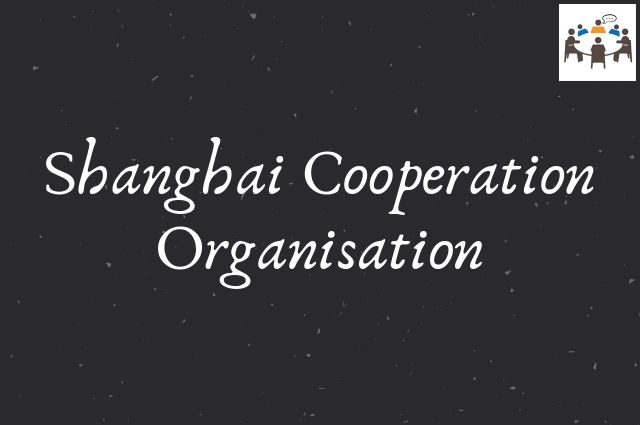Introduction:
The Shanghai Cooperation Organization (SCO) was formed as an extension of the Shanghai Five. The Shanghai Five was formed on 26 April 1996 with China, Russia, Kyrgyzstan, Kazakhstan and Tajikistan. With the inclusion of Uzbekistan SCO was formed on 15 June 2001 in Shanghai, China. Later India and Pakistan also joined as full-time members on 9 June 2017. It is a Eurasian economic, political and security alliance. It meets once a year, takes decisions and adopts guidelines on all the matters of the organization. Regular military exercises are held among the member countries for combating terrorism and to maintain regional peace and stability. In terms of geographical coverage, it is the largest organization and covers nearly half of the world’s population. The Council of Heads is the top decision-making body i.e. the Council of Presidents of all the member countries.
Activities:-
- Cooperation on Security:
- It is one of the major binding heads. It is concerned with the security of its members from terrorism, extremism and separatism.
- In 2004, the ‘Regional Anti-Terrorism Structure‘ (RATS) was formed. It is a very efficient organ of SCO and is engaged in furthering cooperation between member states against terrorism, security, drug trafficking and cyber warfare.
- In 2007, the SCO signed an agreement with the Collective Security Treaty Organization (CSTO) to enhance its security against various threats.
- China and Russia have been conducting large scale military exercises since 2005 under the auspices of the SCO. Other countries excluding India and Pakistan joined them in 2010. India participated in these military exercises for the first time in 2018.
- Economic Cooperation:
- A Framework Agreement to enhance economic cooperation was signed by the SCO member states in 2003. In the same meeting, China proposed a long term objective of establishing a Free Trade Area in the SCO.
- The SCO also encourages joint energy projects, explorations of new hydrocarbon reserves.
- In 2005 SCO Interbank Consortium was also formed to fund future joint projects and provide financial support to the member nations. All the member countries area part of SCO IBC except India.
- Strategic and Political Aspects:
- In 2005, the USA applied for observer status in the SCO but was rejected. Both Russia and China though not directly but are an antithesis to the USA, and with this organization, they are counterbalancing the activities of the USA and NATO in central Asia.
- In 2005 with the unrest in Afghanistan and Iraq and the USA’s indefinite involvement in them, it was also expected that there will be USA’s presence in its bases at Uzbekistan and Kyrgyzstan. And hence the SCO requested the US to set a clear deadline for withdrawing its troops from the SCO member states. Soon afterwards, Uzbekistan asked the USA to leave from its K2 base, which the USA vacated in six months.
- In 2005 Russian foreign minister addressed the SCO members. The major crux of his address was that the SCO countries are powerful and responsible enough to take care of central Asia and the western countries should not interfere in these matters.
Conclusion:
Like many other groups, the SCO also tends to address the same issues. For India, SCO provides a platform where it can maintain its close relations with its all-weather friend Russia, enhance negotiations with China on the persisting border disputes, address the countries about Pakistan’s support to terrorism, and bring all the countries to the agreement of zero tolerance against terrorism. The enhanced relations with the central Asian countries can result in stronger influence, connectivity in the regions of Afghanistan. India should make the best use of the opportunities provided by this group to enhance investments, technology for alternative energy resources and combating terrorism.
Your Turn…
What is your point of view on this topic? Express your thoughts through the comment section below. And subscribe to our blog to read answers to the trending GD topics.
Copyright @ Group Discussion Ideas.

